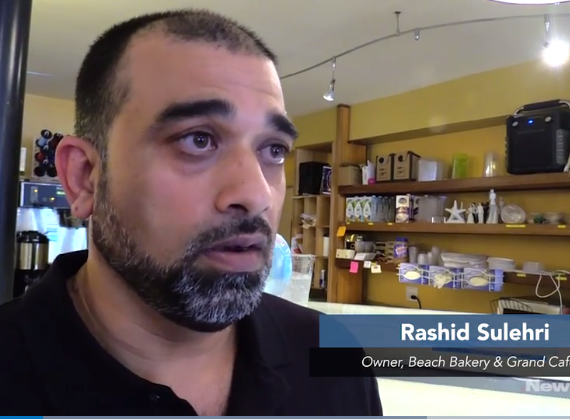
By Bart Jones
Newsday
Updated July 6, 2019 6:00 AM

Long Island’s East End has only one place that’s kosher, a combination bakery-restaurant called Beach Bakery & Grand Café in Westhampton Beach.
So when the business went up for sale last year, the Jewish community was understandably nervous that a new owner would stop serving kosher food, especially the baked goods — those fried jelly croissants, custard doughnuts, the crumb cake.
Their worry was for nothing.
The man who bought the cafe, restaurateur Rashid Sulehri, is committed to keeping the meals kosher — and halal, which follows the dietary standards of his faith, Islam, and dovetails with Jewish law.
Chavie Kahn has been coming to the cafe during the summertime for two decades. She is excited about what changes Sulehri might make.
“It is a new beginning,” she said. “It is critically important we have a kosher place.”
Sulehri came to the United States from Pakistan in 1995, when he was barely in his 20s. He attended Rockland Community College and earned a master’s degree in finance from Oklahoma City University.
Today, at 45, he owns not only the Westhampton eatery but also the Montauk Bake Shoppe and Villa Italian Specialties in East Hampton.
“It’s a dream come true,” Sulehri said of the Beach Bakery. “Sons of Abraham can sit under one roof and they get a chance to see how much in common they have instead of staying away from each other and just thinking how different they are from each other.”
For Rabbi Marc Schneier, who leads The Hampton Synagogue in Westhampton Beach, Sulehri’s pledge to keep the eatery kosher exemplifies “interfaith cooperation and coexistence.”
“It took a devout member of the Muslim faith to come in and to maintain the kosher standards of the bakery for the Jewish community,” Schneier said.
Each religion has unique dietary rules.
A kosher kitchen for example, has two sets of dishes and utensils — one set for dairy and one set for meat because observant Jews can’t combine meat and dairy. And practicing Muslims are prohibited from drinking alcohol.
Still, many of the complex dietary rules for both religions are similar, said Isma H. Chaudhry, who leads the Islamic Center of Long Island in Westbury.
Neither observant Jews nor practicing Muslims can eat pork or pork byproducts, and both can eat meat only from animals that are killed quickly and humanely, she said.
Because of the restrictions on pork and mixing meat and dairy, Beach Bakery doesn’t serve meat.
“This is something we must watch every day,” Sulehri said.
Every ingredient is certified kosher by Rabbi Avraham Bronstein, who also oversees all the food preparation. He played the same role for the previous owner, Simon Jorda, who retired.
“Primarily, we regularly inspect all of the ingredients that enter the bakery — working our way through the storage rooms, refrigerators and freezers — to ensure that everything used is reliably kosher,” said Bronstein, who is a rabbi at the Hampton Synagogue as well.
“Finally, we work with the kitchen staff to make sure that food is prepared in accordance with kosher laws, including making sure that fruits and vegetables are washed and cleaned properly, and that dairy and nondairy dishes and equipment are reliably labeled and separated.”
And Sulehri himself has a familiarity with kosher ingredients and preparation: He spent several years living in the Rockland County hamlet of Monsey, which has a large Orthodox Jewish community. He also worked in a kosher supermarket while he was studying at nearby Rockland Community College.
“For a lot of people it would have been a challenge, but for me it was like a walk in the park,” he said.
Since Sulehri took over Beach Bakery in late April, more and more Muslims are joining his longtime Jewish customers. In early June, dozens of Muslims came to the restaurant on Eid al-Fitr, the festival that marks the end of the holy month of Ramadan.
Both Jews and Muslims were “talking and laughing and having fun” with each other, Sulehri said.
Nauman Batalvi of Setauket first visited the cafe a month ago for Eid al-Fitr — and has been back three times.
“It’s awesome,” said Batalvi, a banker. “I really love that place. I rarely see that variety in a bakery.”
On his last visit, Batalvi took his family to the bakery to celebrate his daughter’s ninth-grade moving-up ceremony.
“It’s really good for the Muslim community,” he said.
A couple of Sundays ago, the restaurant served 2,500 customers, Sulehri said. The place was so packed that the servers and customers could barely move.
“This is unusual,” Sulehri said of both the warm embrace of customers and the opportunity for him as a Muslim to do business with the Jewish community.
Kahn, the longtime patron, sees the cafe as a unifying force — for all faiths, everyone.
“It’s fabulous that it has the potential … to bridge possible differences between the communities and to simultaneously bring the communities together,” she said. “I think it is a wonderful community asset.”
Copyright © 2025 Foundation For Ethnic Understanding. All rights reserved. | Privacy Policy